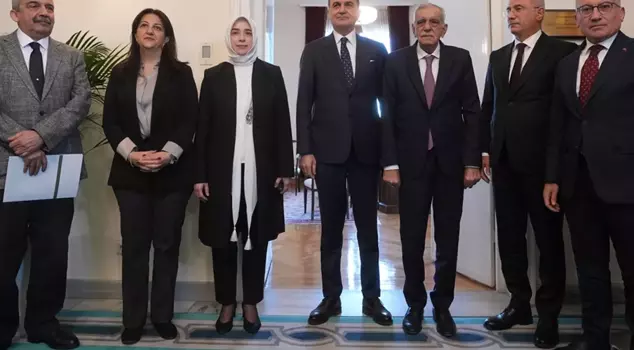
07.01.2025 15:20
AK Party Group Chairman Abdullah Güler responded to claims regarding the meeting with the DEM Party delegation in Imralı, which suggested that a general amnesty, including for terrorist offenders, and the possibility of house arrest for terrorist leader Abdullah Öcalan would be on the agenda, stating, "Amnesty is not on our agenda right now. This is not a process of resolution."
On December 28, Saturday, the DEM Party delegation that met with terrorist leader Abdullah Öcalan in Imralı, came together with the AK Party group in the Parliament yesterday.
"A VERY IMPORTANT EFFORT FOR TURKEY'S NORMALIZATION"
AK Party Group Chairman Abdullah Güler, who made evaluations regarding the meeting that resonated widely in the public, stated, "I cannot say anything about the content; because it is a private meeting within a mutual trust relationship. However, there is a good environment for resolving and concluding this issue, which has become a significant matter for Turkey, having had great effects both economically and socially for many years. At least, the atmosphere is very positive. We see that everyone is somehow trying to contribute to this with good intentions. We see that the friends we listened to yesterday sincerely continue this intention to contribute to this positive atmosphere, and this process will continue from now on. We see the resolution of these issues, which have been a major disaster for Turkey, as a very important effort for Turkey's normalization by 2025. I see a positive atmosphere, and hopefully, the result will also be positive and end well," he said.
"IT IS VALUABLE THAT THE PARLIAMENT IS BEING INFORMED"
Güler emphasized the importance of the process by drawing attention to regional risks. Güler stated, "We will witness many events that will make Turkey's social peace much more important in the coming periods, and in this respect, the Parliament is an important place where this social representation is provided. It is very valuable that the Parliament and the political party groups are being directly informed," he said.
"THERE IS NO GENERAL AMNESTY, I DO NOT FIND IT RIGHT TO APPROACH WITH A CONDITIONAL PROCESS"
In response to questions about discussions regarding a general amnesty, including for terrorist offenders and the possibility of house arrest for Abdullah Öcalan, Güler stated that the issue of general amnesty is not on their agenda and said, "I do not find it right to approach these events with a conditional, interconnected process, like 'if that doesn't happen, nothing will happen.' There is no such issue as an amnesty on our agenda right now. In our penal execution law, there are already certain matters that fall under the authority of our President after a certain age for prisoners who have become so ill, bedridden, and in need of care that they cannot maintain their vital position.
When this is tied to the forensic medicine board report, certain illnesses are already being released, just like in the cases of the February 28 generals, and they are being released for their care and treatment; that opportunity already exists. However, I do not think it is very correct to conduct this process solely based on that. In the current penal execution regulation, you cannot evaluate this by making a distinction between crimes. You do not determine the form of execution based on the crime committed by the person. Whether it is a terrorist offender or a common criminal, the same punishment must be executed within these conditions, in the context of the same human rights characteristics; you cannot make that distinction. But it is not right to bring this up and tie it to that. We need to elevate this to a level that transforms and changes social peace. Just saying, 'There is one person, let's make an execution regulation regarding this, and tie it to this' would be very simplistic."